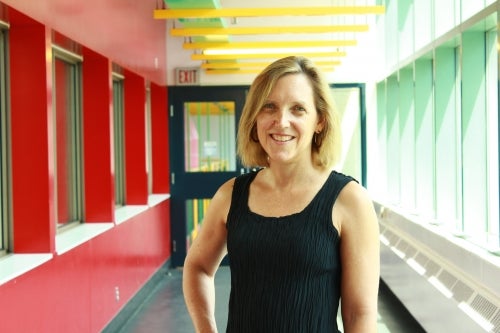 David R. Cheriton School of Computer Science professor Joanne Atlee has been appointed as the first Director of Women in Computer Science. A long time advocate of supporting women in computer science, Atlee explains that she is happy to take on the role and continue pushing for women to feel comfortable and confident in the field.
David R. Cheriton School of Computer Science professor Joanne Atlee has been appointed as the first Director of Women in Computer Science. A long time advocate of supporting women in computer science, Atlee explains that she is happy to take on the role and continue pushing for women to feel comfortable and confident in the field.
Atlee’s new role will help bring diversity into the leadership of the School and increase consideration and impact of decisions on under-represented populations. “Diversity brings a greater variety of ideas and viewpoints to the table,” she said.
The School of Computer Science’s initiatives to support women in computing are long-standing. It’s no secret that female enrollment in computer science at all institutions is low – Waterloo traditionally totes 15% female enrollment but, those numbers are steadily increasing with 2015 enrollment numbers at 25%. Atlee explains that half the battle is encouraging girls to learn about computer science when they’re young, and the other half is giving them the support they need once they arrive at university.
Outreach activities offered by the School can help young women interested in computer science improve their familiarity with the technology before applying to university, and hopefully help combat the cultural influences that lead to disinterest in math and science during pre-university years. Once enrolled in post-secondary education, it’s still important to have supportive activities to help students continue to succeed.
“At the university level, the biggest challenge is that on average women can come in with a weaker background in computing – not a weaker aptitude, a weaker background. They catch up within the first couple years of their studies but during that first year, the difference is perceived to have an impact. They may feel like they are falling behind in their courses, when in fact they’re often doing just fine.”
In 2007, the School created a standing committee for Women in Computer Science - WICS. For the last two years, a WICS undergraduate subcommittee – comprised of undergraduate students – has worked to run technical workshops that expose students within the School and across campus to technology that they may be unfamiliar with. In the past, the students who make up the undergraduate subcommittee have run three-day python workshops, a number of git and web development workshops, and hardware workshops.
“I love working with the students,” said Atlee. “Watching them this past year running events designed to support women in computing has been phenomenal. It’s great to see them energized and hear them explain that they don’t want special treatment; they don’t want to be hired just because they’re women. They are as technically competent as their male colleagues.”
While she’ll be focusing on women, Atlee recognizes that all students should be able to take advantage of opportunities. That’s why when WICS offers activities such as career panels or discussion groups that focus on equality in the industry all students are invited regardless of gender. However, Atlee believes that it’s important to also give women spaces where they can feel safe and confident.
“Some of the activities we offer focus on information and mentoring that female students tend to miss out on if they are feeling isolated in their courses. It tends to be the kind of mentoring and peer learning that male students get from one another. But this peer network in the classroom is often lacking for female students, so we want to provide working and mentoring environments where they can share their knowledge and experiences, and learn from one another – in a setting where they do not have to prove themselves or have to fight the perception that women don’t understand the technology.”
The School is in the early stages of connecting with various academic and industry partners to create a strong, coordinated network of women in computer science. “It’s a great time for this to be happening. Industry is finally on board with trying to push for greater equality. There are multiple studies now that showcase the effects of diversity on the bottom line of companies and the quality of their products. Companies now see that it is a competitive advantage to have a diverse workforce
For now though, Atlee says that her top priority is to ensure that the women who are enrolled in computer science have a positive exposure to computing and that they see computing as an attractive career option.
“First year computing courses can be daunting. There is a wide spectrum of students, some of whom have been coding since they were in primary school and many others who have no programming experience at all. We work hard to ensure that our curriculum, the classroom environment, and lab environments do not bias against beginner programmers. Students succeed because they are smart, are mathematically inclined, are naturally skilled at solving programs, and work hard to improve their skill set – and they succeed regardless of how much pre-university experience they have.”




